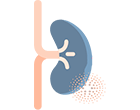Primary Hyperoxaluria Precision Panel
Primary Hyperoxaluria (PH) is a group of inherited metabolic diseases of the liver characterized by increased formation of calcium-oxalate stones in kidneys with the subsequent development of nephrolithiasis and chronic kidney disease.




